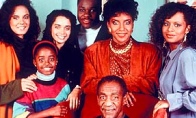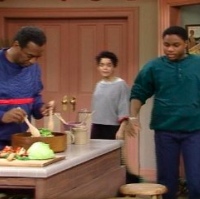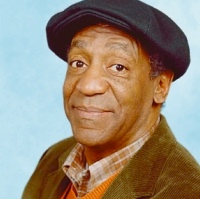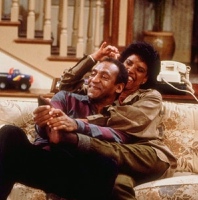- About Us
- Columns
- Letters
- Cartoons
- The Udder Limits
- Archives
- Ezy Reading Archive
- 2024 Cud Archives
- 2023 Cud Archives
- 2022 Cud Archives
- 2021 Cud Archives
- 2020 Cud Archives
- 2015-2019
- 2010-2014
- 2004-2009
 |
The Cud On The Tube: |
One night a couple of weeks ago I was sleepless and inconsolable. I was questioning the world and my place in it. Around two in the morning I got up and turned on the television and was greeted by something that I had not only missed years before, but completely forgotten that I’d missed. I was greeted with the last episode of the greatest American television sitcom.
I was born in 1977. I hate to call it an innocuous year, but it certainly feels like one. Nothing really happened in the year of my birth—no world changing, paradigm-shifting event. The nation was still recovering from the burn of Watergate, we were well into the age of disco, there were cars lined up at all the gas pumps. Elvis died. Fleetwood Mack released  Rumors. Yet those of us born then do have an overwhelming positive thing in our favor. We were young enough to enjoy and be influenced by a comedian named William Cosby.
Rumors. Yet those of us born then do have an overwhelming positive thing in our favor. We were young enough to enjoy and be influenced by a comedian named William Cosby.
Bill Cosby came to prominence in the 70s largely due to his stand up comedy routine and his narration of Fat Albert. I don’t remember much about Fat Albert, except that there was a fat dude and a skinny dude and something about a junkyard. It doesn’t matter, Fat Albert= unimportant. What matters is that it gave Cosby a platform. When it was finally time for Cosby to elevate his comedy to a new level, he was ready.
The Cosby Show premiered in September 1984 to great reviews. All Americans, regardless or race or income level could find something to relate to in the Huxtable family. At that point the sitcom was pretty much dead, all but rolling over in it’s grave, and many critics had predicted that it was on its final legs. All of that speculation ended in September of 1984.
The Cosby Show redefined the very idea of what sitcom comedy should be. It is funny, but with an overt social message. It embraces one in a feeling of comfort and familiarity. The easy relationship between Cosby and his five television children was authentic. The show has laugh tracks but they are never gratuitous, never gaudy—it was good enough that they never had to be.
In the final episode, Cliff’s son Theo graduates from college. It is a device used to stage a gigantic family reunion in the Huxtable household. Cliff (Bill Cosby) sp ends most of the episode gushing over his children, Claire is both emotional and kind of swarmy. All in all it was exactly as Cosby should be.
ends most of the episode gushing over his children, Claire is both emotional and kind of swarmy. All in all it was exactly as Cosby should be.
The lessons of The Cosby Show were inspirational. The punishments were stern but fair. The kids were good kids—the type who obviously were loved by their two parents and made to feel like they were wanted. They weren’t losers or miscreants, largely because their parents wouldn’t allow them to be. Though fictional characters, Cliff and Claire could just as well serve as models to parents. They were both professional and hardworking. They were kind, helpful, and realized that one of the most important gifts that they could give to their children was the gift of good humor.
The influence of The Cosby Show on world popular culture cannot be overstated. Though it is an American television show though it served as a beacon for just about everyone else. It showed white families that black f amilies really were not so different from their own. It showed minorities that hope was out there. America’s greatness lies not only in political freedom, but also in its idea of social mobility, that people can be born poor and (through hard work and a little luck) become rich. It instilled that message in spades through Claire and Cliff Huxtable—two role models who were human and tired and overworked, but who never forgot that the most important thing in their lives is their children.
amilies really were not so different from their own. It showed minorities that hope was out there. America’s greatness lies not only in political freedom, but also in its idea of social mobility, that people can be born poor and (through hard work and a little luck) become rich. It instilled that message in spades through Claire and Cliff Huxtable—two role models who were human and tired and overworked, but who never forgot that the most important thing in their lives is their children.
Near the end of the episode Cliff reminisces back to when Theo was a teenager. Theo is considering dropping out of school and Cliff is trying to talk him out of it. Earlier in the finale we learned that Cliff and Claire really didn’t think that Theo would ever make it through high school, much less college. The teenaged Theo was equally skeptical.
“You’re a doctor and mom’s a lawyer, but maybe I was born to be a regular person. Maybe you can just accept who I am and love me anyway, because I’m your son.”
What do we expect? A pep talk? A light punch on the arm? A Father Knows Best moment? The genius of Cosby is that he turns these expectations right on their head.
“Theo, that is the dumbest thing I’ve heard in my life! No wonder you get D’s in everything… Now I’m telling you that you are going to try as hard as you can. I am your father! I brought you into this world and I will take you out!”
God, how awesome is that? How many of us have gotten identically chastised at some point in our lives? Cliff threatens not out of malice, but out of love. As the episode ends Cliff, never the handyman that he would have liked to be, has finally managed the doorbell. It’s been a running joke throughout the series. Cliff is completely unable to fix anything, but he can fix this. Cliff takes Claire by the hand and they start dancing. The stage lights come on and (in a way that is not all that different from real life) they all walk off together into a future that none of them could foresee, but that you just knew would continue to be stable, upwardly mobile, warm, and funny.
Real life does not offer any similar sort of comforts. The future is a big blob of nothingness, the past tinged with so much regret. However perhaps in times of doubt we can all find a little inspiration tucked away in a corner of television history. Perhaps we can open an eye, have a laugh, and wake up in the morning reinvigorated and reassured that hard work does indeed have a pay off. Sometimes we just need a guide to show us the way there.
Tim Rich is a freelance writer and man about town based in Portland and Bar Harbor, Maine. He is a professional political activist. He spends his free time hiking, reading, and preparing for the National Toboggan Championships, which he fully intends to win.
